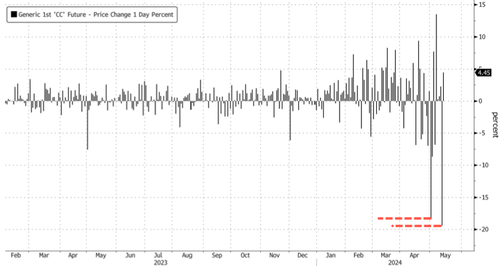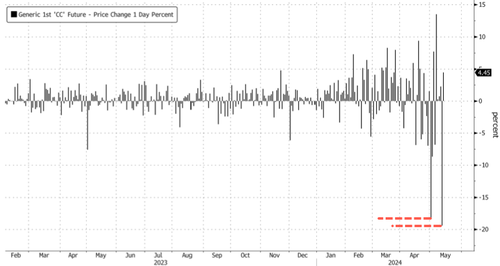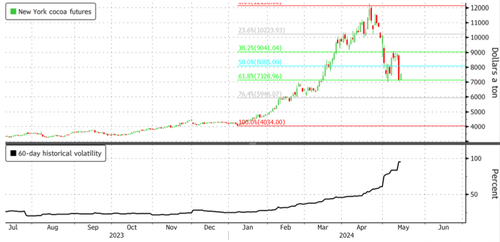
Cocoa Market Hit With Second Crash In Weeks As Liquidity Evaporates
Cocoa futures in New York crashed for the second time in just days as liquidity evaporated, and a new weather forecast points to improved weather conditions for top producers of the bean in West Africa.
The most active cocoa contract in New York plunged 19% on Monday, recovering some losses on Tuesday, up about 5%. This followed the cocoa crash on May 1 of 18%.

Cocoa prices are retracing at the 61.8% Fibo level from this year’s record surge from $4,000 a ton to $12,000. The rollercoaster price action continues to propel 60-day historical volatility higher.

Bloomberg said the driver in the latest cocoa crash was due to a weather forecast of increased „rainfall boosting the outlook for crops” and „low open interest in cocoa markets.”
Donald Keeney, senior meteorologist at Maxar Technologies, said rains „should improve conditions quite a bit” across Ghana, the world’s second-biggest grower, and Indonesia. He said the top producer, Ivory Coast, will also receive rainfall, adding that more precipitation is needed to reverse arid conditions across the world’s top-producing cocoa farms.
More from Bloomberg:
A lack of moisture in top West African cocoa producers has weighed on supply in a market already hit by aging trees and disease. Prices saw a 9% recovery last week, with money managers boosting their net-bullish bets to a three-week high. Still, some expect that a record price set in mid-April will mark the peak of the historic rally.
Producers in Ivory Coast are worried that thunderstorms may pluck off the few flowers on trees and hamper plant growth. The mid-crop harvest is small in southeast Ivory coast compared with last year. Rains are making it difficult to transport beans to Ivorian cities, while smuggling is still taking place across the border to take advantage of better prices. In Cameroon, bean theft is an increasing problem. That’s prompting farmers to dry beans for a shorter period, which may impact quality. In southeast Nigeria, the rains have ensured that the soil is getting its moisture back. In the southwest, trees are yet to respond to the rains. The delay in flowering is the result of the use of the wrong anti-fungal chemicals by farmers in previous years, one grower in Ondo state said.
Days ago, Rabobank analyst Paul Joules said cocoa prices have likely peaked:
„A combination of weakening global demand and production responses, particularly from countries without a fixed farmgate price, will help alleviate the pronounced uncertainty baked into current futures pricing,” Joules said.
Still, „it’s likely that inflated cocoa prices will stick around for the next few years,” he noted, adding prices are unlikely to return to „normal” levels quickly but have passed their peak.
Remember what Bloomberg’s Javier Blas warned about last month:
Liquidity in cocoa markets is quickly evaporating.
The number of outstanding contracts (open interest) in New York and London combined has tumbled 40% since mid-January. NY open interest is at a 12-year low.#cocoa #chocflation
— Javier Blas (@JavierBlas) April 9, 2024
Meanwhile, commodity trader Pierre Andurand stands by his $20,000 price target for later this year.
Tyler Durden
Tue, 05/14/2024 – 13:40

 1 rok temu
1 rok temu
















